Access Corp H1 2025 Result: Profit Dips with Non-Interest Income,Cost Debacle As Key Drivers
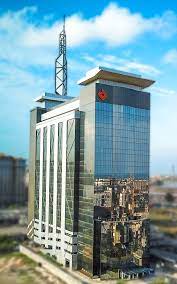
Access Holdings’ H1 2025 financial performance reveals a concerning trend, with the bank’s profitability plummeting amidst a challenging economic environment. Despite a 13.8% growth in gross earnings, the bank’s bottom line was severely impacted by a perfect storm of higher impairment charges, declining non-interest income, and rising operating expenses.
Access Holdings’ profitability decline in H1 2025 was driven by a combination of factors, including a significant 87.45% increase in impairment charges to ₦230.07 billion, reflecting the challenging economic environment and potential credit risks. The bank’s non-interest income also declined by 37.17% to ₦454.66 billion, primarily due to lower foreign exchange revaluation gains. Furthermore, operating expenses rose by 12.47% to ₦808.78 billion, driven by inflation, personnel expansion, and increased IT expenditure. These challenges were exacerbated by economic headwinds, including high inflation, currency volatility, and rising interest rates. Consequently, the bank’s earnings per share (EPS) plummeted by 51.12% to ₦3.72, underscoring the significant decline in profitability.
While the return on equity (ROE) and return on assets (ROA) declined to 11.4% and 1.0%, respectively, due to increased share capital and operating costs, its cost-to-income ratio (CIR) for Access Holdings as of Q1 2025 was 60.05%.Based on the available information, the bank’s CIR has shown slight efficiency gains, with a CIR of 59.5% reported in H1 2025. If you need more up-to-date information, you may want to check Access Holdings’ latest financial reports or investor presentations ¹ ².
This scenario started in the first quarter .Access Holdings’ Q1 2025 results reveal a concerning trend, with declining profitability ratios and rising costs overshad foreshadowed by a 4.96% return on equity (ROE) and 0.47% return on assets (ROA). Although the cost-to-income ratio (CIR) improved to 60.05%, it may be too little, too late, as rising interest expenses and costs of funds continue to plague the bank. With a price-to-earnings ratio (P/E) of 4.56x and price-to-book value (P/B) of 0.32x, the stock appears undervalued, but inorganic growth strategies and heavier cost burdens raise concerns about future profitability. Can Access Holdings stem the tide of rising costs and declining profitability, or will its growth ambitions be derailed by its own financials?Can Access Holdings navigate these turbulent waters and restore its profitability?
Fundamentals
Access Holdings Plc (ACCESSCORP) is Nigeria’s largest financial services group by asset size (N42.45trn in H1 20205), with a diversified structure that integrates commercial banking, asset management, pensions, payments, and insurance. Since transitioning into a holding company operational framework in 2022, Access Holdings has used its extensive footprint across 21 African economies and key international financial hubs in Europe and Asia to strengthen earnings stability and expand its income sources beyond core banking operations. This structural evolution has enabled the group to navigate Nigeria’s challenging macro- and microeconomic environment more effectively.
The new structure has enabled the group to leverage its off-balance-sheet transactions and enhance its international market relevance. Trade financing has grown notably, creating opportunities for significant cross-border service delivery and positioning the bank strategically within the framework of the African Continental Free Trade Area (AfCFTA). However, a few concerns show up here. Analysts have noted that Access Bank’s brick-and-mortar approach to continental expansion contrasts with the digital and collaborative approaches of its competitors. In an increasingly data-driven world, financial services have relied more on technology than physical interaction. This may reduce transaction costs across continental markets and allow newer banks to scale rapidly at lower operating costs, thereby intensifying financial competition and rivalry. Nevertheless, analysts believe that Access Bank has done well with its acquisition strategy, which appears to have been refined to support its growing bottom line. The continental expansion has reduced its country risk exposure and diversified its lending and deposit portfolios.
The group’s strategic direction appears focused on operational efficiency, digital transformation, and cross-border expansion to capture emerging opportunities across Africa. According to recent filings and investor updates, Access Holdings has shown strong asset quality, with its non-performing loan (NPL) ratio improving slightly to 2.68% in the first half of 2025, from 2.72% a year earlier. This performance underlines the management’s disciplined credit risk framework and proactive loan recovery measures. Moreover, its capital adequacy remains robust, placing the group in a solid position ahead of the Central Bank of Nigeria’s (CBN) new recapitalisation directive, which requires internationally licensed banks to attain a minimum capital base of N500bn by March 2026.
Risk management remains a cornerstone of Access Holdings’ strategy. The group continues to maintain a balanced deposit mix, strong treasury operations, and heavy technology investment to improve efficiency and expand its customer base. While the group’s profitability has been tempered by macroeconomic headwinds, its ability to sustain growth across multiple business lines continues to support its standing as a systemically important financial institution in Nigeria and sub-Saharan Africa (see illustration 1 below).
Illustration 1:
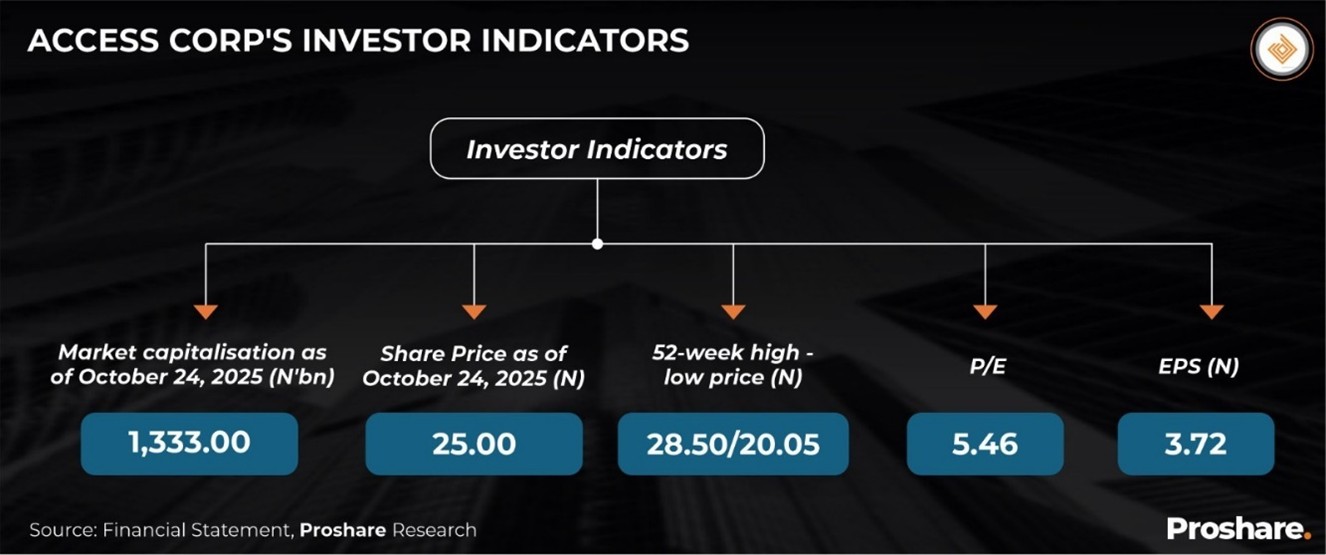
Key Highlights in H1 2025
- AccessCorp’s interest income ticked up by +38.87% from N1.41trn in H1 2024 to N2.04trn in H1 2025.
- Interest expense rose by +10.53% to N1.06trn in H1 2025 from N958.73bn in H1 2024.
- Foreign exchange gain dipped by -90.75% to N45.94bn in H1 2025 from N496.91bn in H1 2024.
- Earnings per share (EPS) declined by -51.12% from N7.61 in H1 2024 to N3.72 in H1 2025 (see table 1 below).
Table 1:
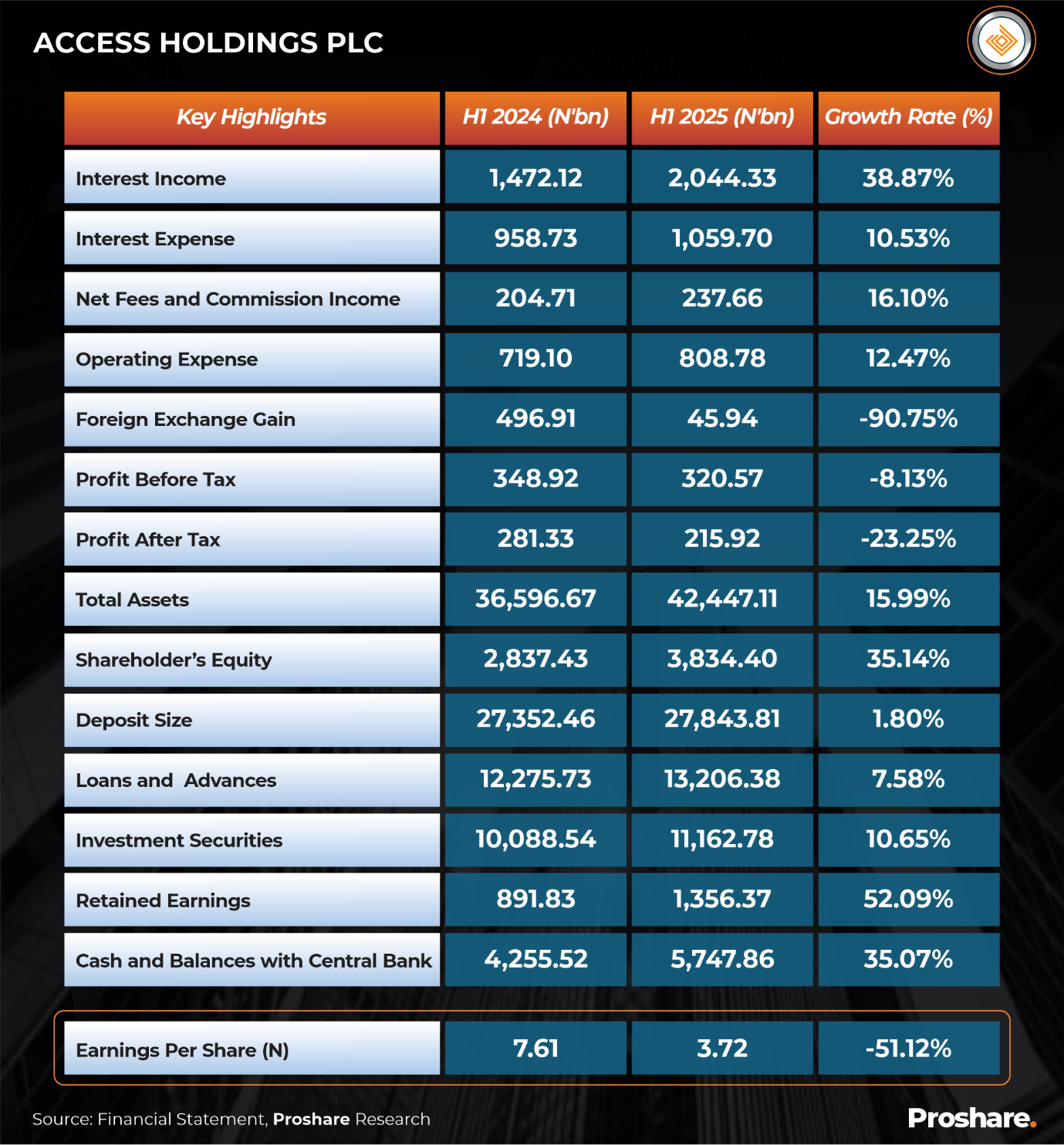
Financials
AccessCorp delivered a strong financial performance in H1 2025, reflecting resilience amidst a volatile operating landscape. Gross earnings rose by +13.81% to N2.50trn, compared with N2.20trn in H1 2024, driven primarily by a +38.87% increase in interest income, which reached N2.04trn in H1 2025 (vs N1.47trn in H1 2024). This growth was fuelled by higher yields on loans and investment securities, benefiting from the elevated interest rate environment. Net interest income expanded by +91.79% to N984.63bn, supported by improved asset pricing and a well-structured balance sheet that optimised cost of funds. However, non-interest income declined sharply by -37.17% to N454.66bn, as foreign exchange revaluation gains fell significantly by -90.75% following a period of naira stabilisation. This reduction in FX gains weighed on overall income diversification, which had previously been a key earnings driver during currency volatility (see chart 1 below).
Chart 1:
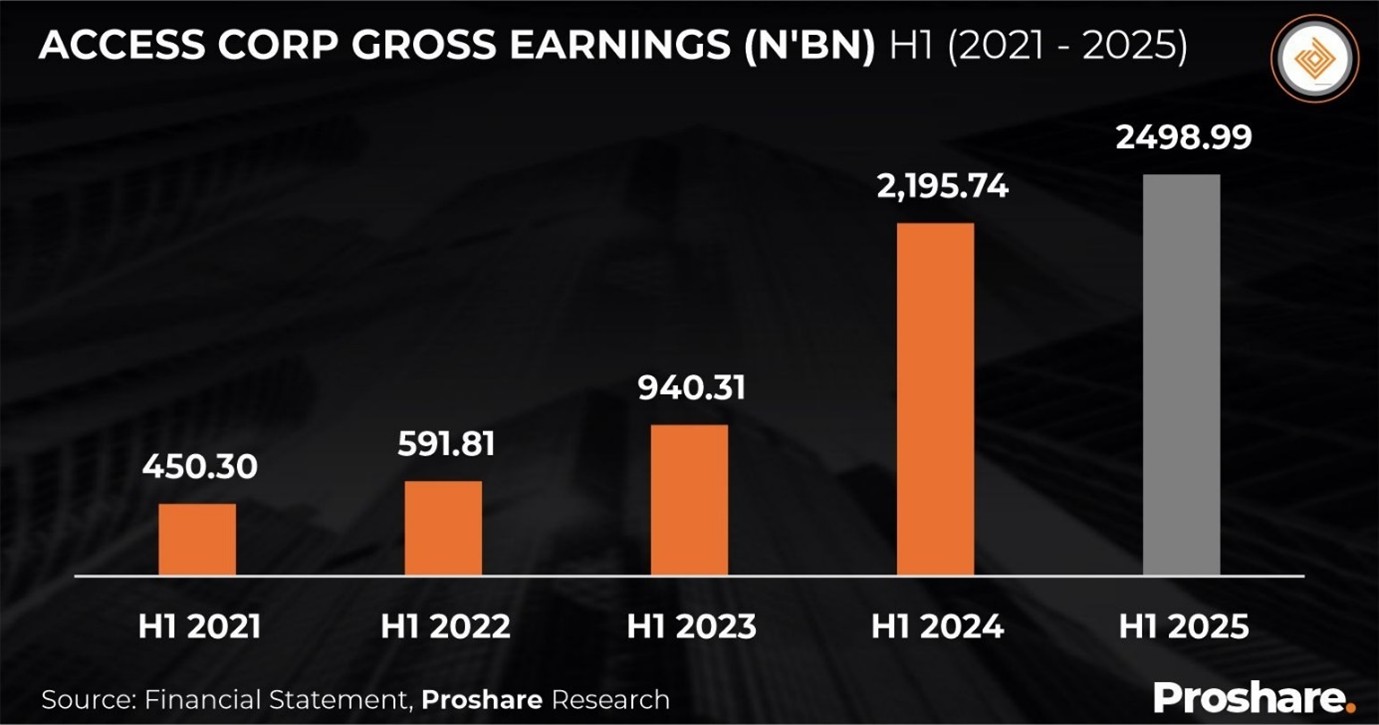
The group’s profit before tax (PBT) moderated by -8.13% year-on-year (Y-o-Y) to N320.57bn in H1 2025, compared to N348.92bn in H1 2024, while profit after tax (PAT) stood at N215.92bn (down by -23.25%), indicating a decline due to higher impairments (up by +87.45% to N230.07bn in H1 2025 from N122.74bn in H1 2024) and reduced non-interest income. Operating expenses rose by +12.47% to N808.78bn, reflecting the impact of inflation, personnel expansion, and increased IT expenditure associated with ongoing digital transformation. Despite this moderation, Access Holdings remains one of the most profitable financial institutions in Nigeria in absolute terms, with its strong core earnings providing a buffer against short-term macroeconomic disruptions (see chart 2 below).
Chart 2:
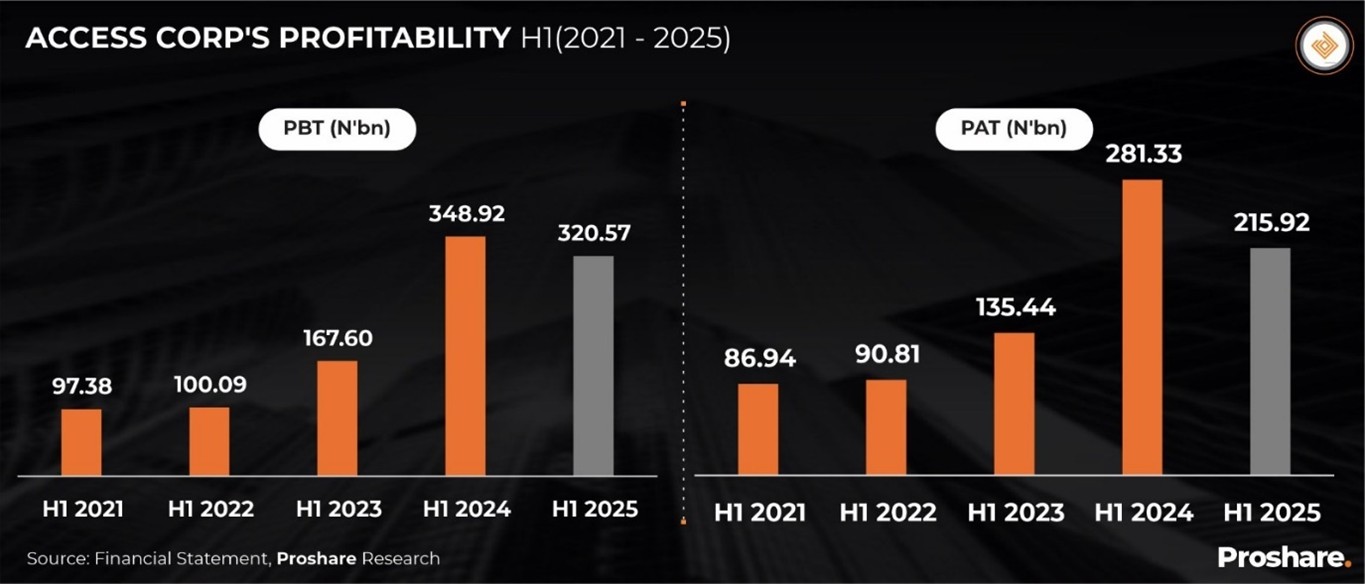
Access Holdings’ balance sheet continues to exhibit strong growth and sound liquidity. Total assets expanded by +15.99% to N42.45trn as of H1 2025, reinforcing its position as the largest financial institution in Nigeria by asset base. The expansion was driven by growth in both customer deposits and investment securities. Customer deposits rose by +13.88% to N22.90trn from N20.11trn in H1 2024, reflecting increased retail participation and digital channel penetration, while loans and advances grew by +7.58% to N13.21trn, as the group adopted a more conservative credit stance amid prevailing economic uncertainties.
Investment securities increased by +10.65%, demonstrating the group’s strategic reallocation toward risk-free, high-yielding government instruments. Shareholders’ equity also strengthened, rising by +35.14% to N3.83trn, driven by a growth in retained earnings and a +142.80% increase in share premium, which offers sufficient leeway for the upcoming recapitalisation exercise. Borrowings declined by -4.64% from N3.60trn in H1 2024 to N3.30trn in H1 2025, reflecting efforts to reduce leverage and reliance on external funding, while retained earnings climbed by +52.09%, underscoring the group’s profitability and prudent dividend policy.
These developments highlight a well-capitalised, liquid, and prudently managed balance sheet capable of sustaining future growth. Access Holdings’ liquidity and capital adequacy ratios remain comfortably above regulatory thresholds, positioning it for sustained expansion across its operating markets (see table 2below).
Table 2:
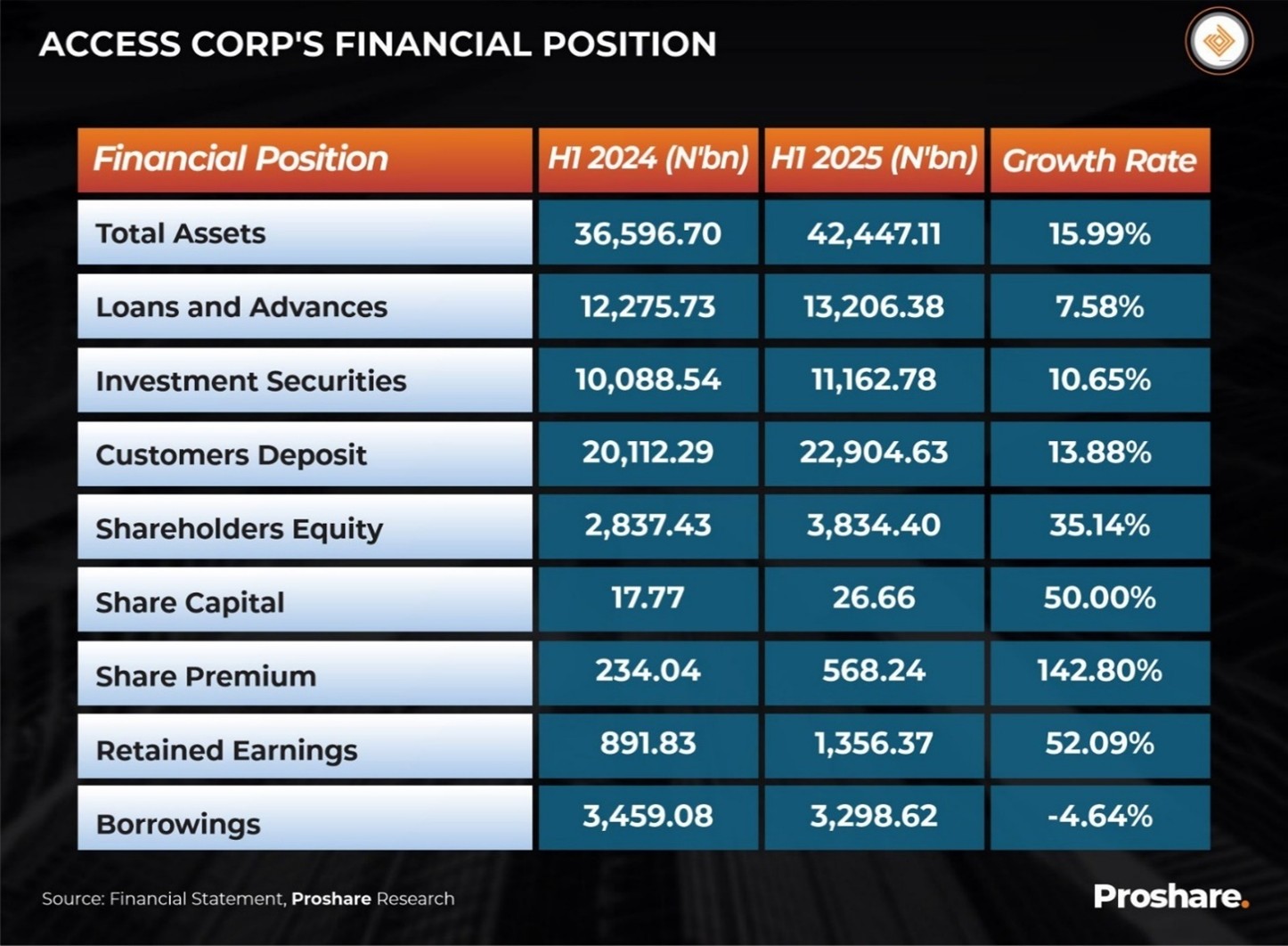
Access Holdings reported a return on equity (ROE) of 11.4% in H1 2025, down from 24.6% in H1 2024, mainly due to capital accretion following its rights issue and a build-up in retained earnings. Return on assets (ROA) similarly declined to 1.0%, reflecting the expanded asset base and higher operating costs. The net interest margin (NIM) improved to 8.82% from 5.10%, evidencing enhanced yield management and repricing efficiency. The group’s cost-to-income ratio (CIR) stood at 59.5%, showing slight efficiency gains despite inflationary pressures and technology-related expenses. The loan-to-deposit ratio (LDR) fell to 57.66% from 61.04%, aligning with the group’s cautious credit risk posture. In comparison, the NPL ratio remained one of the lowest in the industry at 2.68%, demonstrating strong credit quality and effective monitoring (see table 3 below).
Table 3:
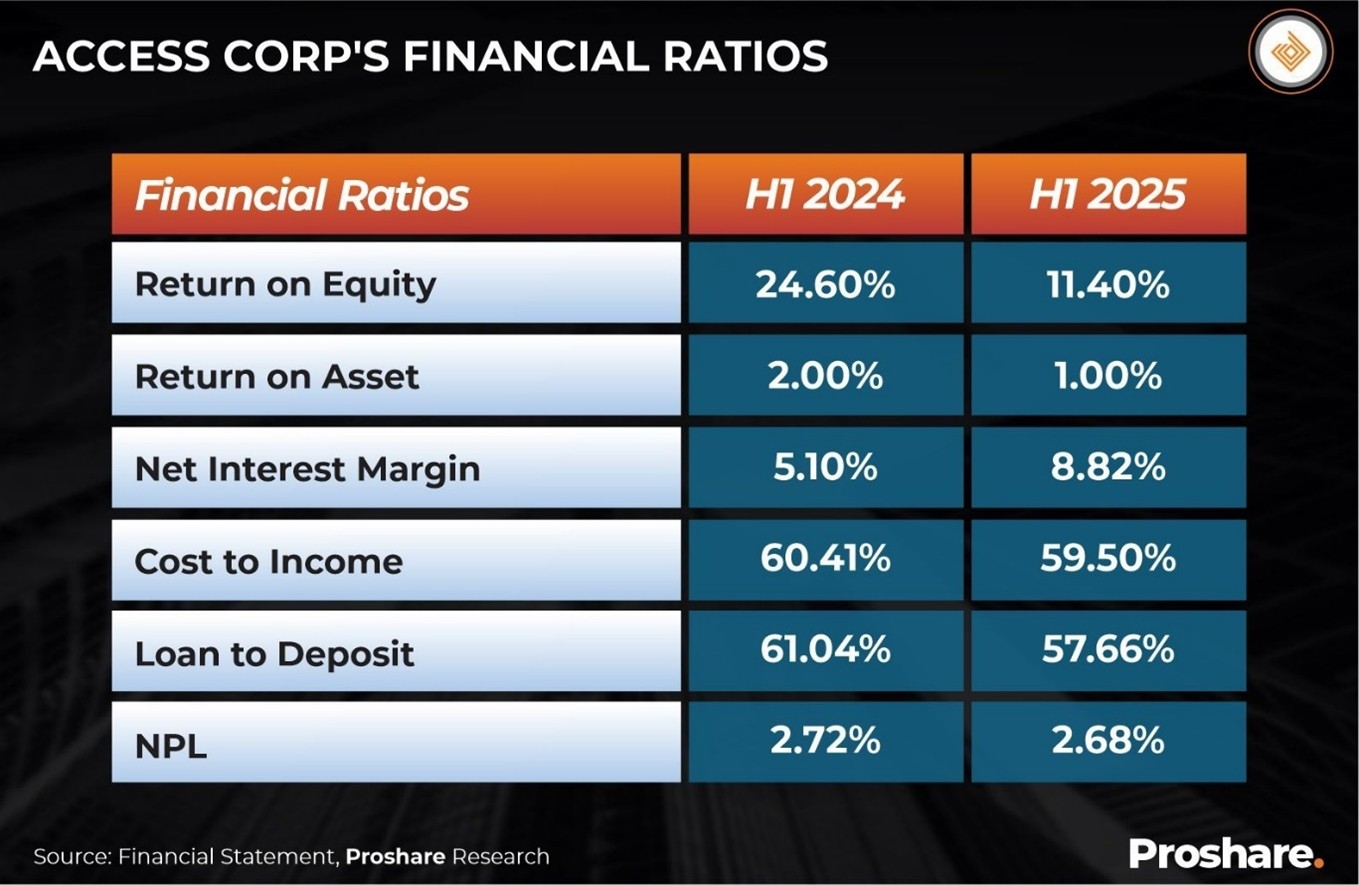
Access Holdings’ valuation remains attractive relative to its Tier-1 peers. The group trades at a price-to-earnings (P/E) ratio of 5.46x and a price-to-book (P/B) ratio of 0.31x, both below industry averages of 7.5x and 0.8x, respectively. This reflects a considerable undervaluation of the stock relative to its intrinsic worth, suggesting potential upside for investors with a medium to long-term horizon (see table 4 below).
Table 4:
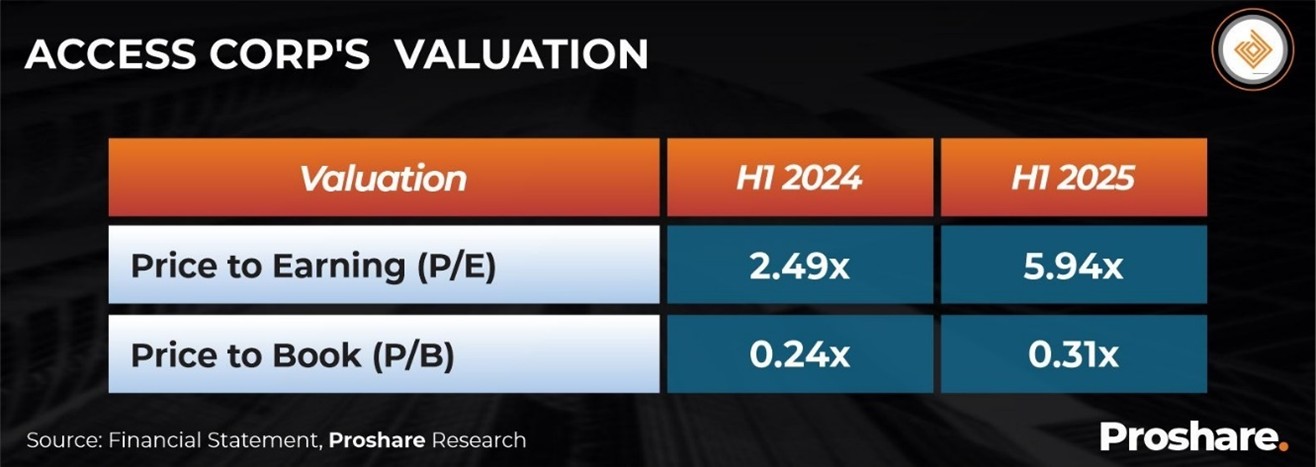
Technical
Access Holdings Plc’s share price exhibited a strong upward trajectory through late 2024 into early 2025, before stabilising mid-year and entering a mild consolidation phase. Over the twelve months under review, the stock traded between a low of N20.05 (June 2025) and a high of N28.50 (July 2025), reflecting a 52-week price spread of about 42.14%, underscoring both investor optimism and market volatility in the period.
Overall, the group’s share price movement between October 2024 and October 2025 shows a classic three-phase movement: a steady rally, a mid-year correction, and subsequent consolidation. Investor sentiment remains broadly positive, supported by AccessCorp’s strong fundamentals, capital resilience, and regional growth prospects. However, inflation, FX volatility, and cost pressures could limit short-term price appreciation (see chart 3 below).
Chart 3:
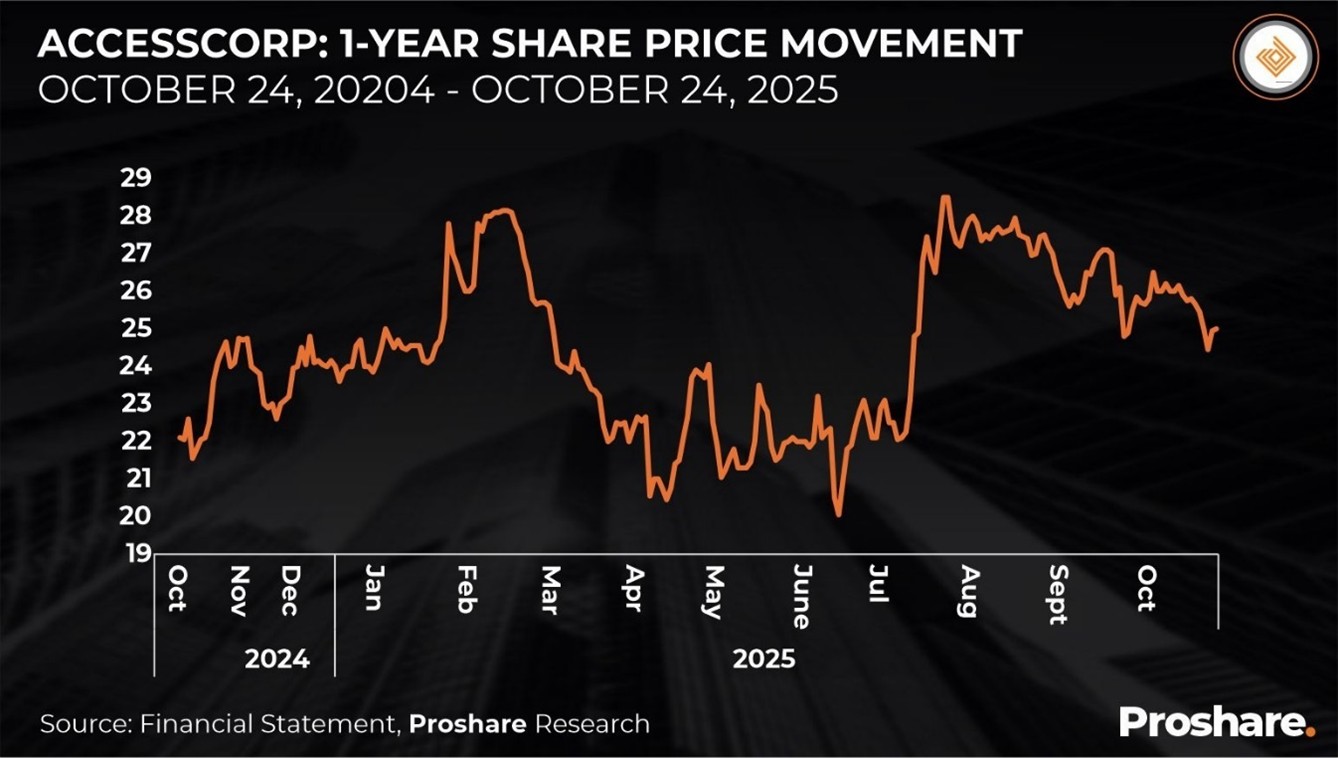
Peer Analysis
Access Holdings’ H1 2025 performance shows leadership in scale but faces profitability challenges. While the Group towers in size and funding ability, its high-cost structure, moderate margins, and weaker PBT results indicate a need for improved operational efficiency and cost management. Over the medium term, AccessCorp’s extensive presence across Africa, digital growth strategy, and strong balance sheet position it for ongoing earnings recovery once cost pressures ease and interest margins stabilise (see illustration 2 below)
Illustration 2:
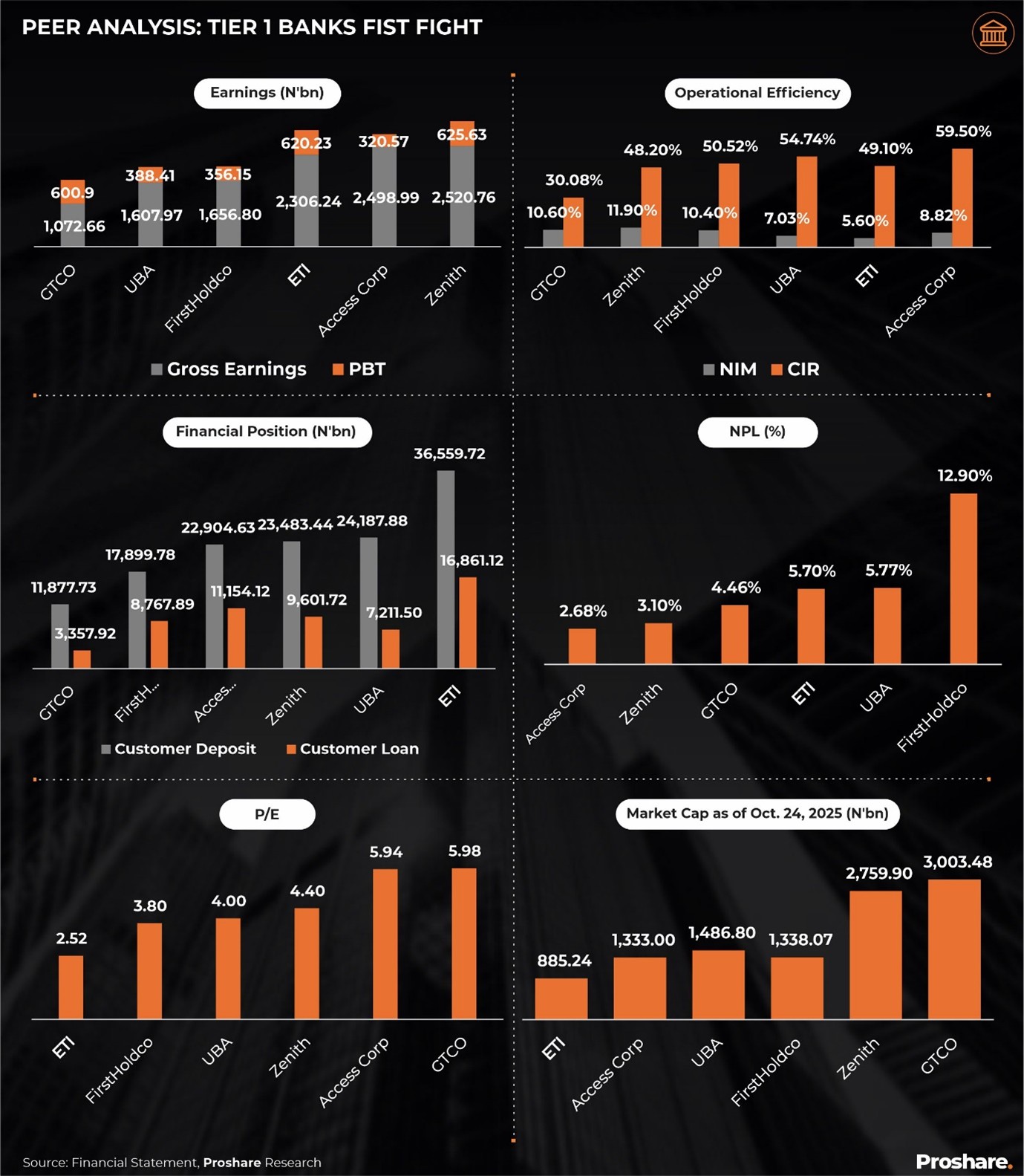
Opinion
Access Holdings Plc remains a fundamentally strong and systemically important banking group with considerable growth prospects across Africa. Despite earnings pressure in H1 2025 from increased impairments and lower FX gains, the group’s core performance metrics, particularly net interest income, asset expansion, and capital adequacy, remain solid. Its diversified revenue sources, growing digital ecosystem, and extensive pan-African network give it a lasting competitive edge.
Looking ahead, Access Holdings is expected to benefit from its ongoing recapitalisation efforts, which will further strengthen its balance sheet and enable strategic expansion into new markets. The group’s investments in payments and fintech subsidiaries are poised to unlock additional non-interest income sources, while continued digital innovation should drive cost efficiencies.
Access Holdings Plc appears to reflect hidden value at current levels. With its strong fundamentals, growing capital base, and strategic focus on digital and regional expansion, the company offers investors a compelling buy opportunity as advised by analysts for medium- to long-term portfolio positioning in Nigeria’s financial services sector.
Strategic Expansionary Move and Conceptual Issues
Amid economic challenges such as naira devaluation, AccessCorp has in recent times focused on deals in East and Southern Africa. While some of its subsidiaries were created through greenfield investments, updates for the transaction in 2025 may cover ongoing integrations. The timeline of events showed the group’s expansionary strategies as follows:
- Domestic Focus (2005–2019): Early M&A consolidated Nigerian operations, responding to CBN reforms; the Diamond merger was transformative, creating scale.
- Pan-African Expansion (2020–2025): Shift to acquisitions in 13+ countries, driven by CEO Herbert Wigwe’s vision (until his passing in 2024) and successor strategies. Total assets reached N42.45trn by H1 2025, with M&A contributing to 38.9% growth in interest income.
- Recent Trends: 2024–2025 deals (e.g., Kenya, South Africa) align with CBN’s N500bn capital hike for international banks; expect more in Uganda/Tanzania per analyst views.
- Regulatory Note: All deals require CBN, SEC, and host-country approvals; no major antitrust issues noted.
- Other Expansions: Includes Mozambique (2020, likely acquisition of Standard Chartered or similar) and non-M&A restructurings like the 2022 HoldCo transition (see table 5 below)
Table 5:
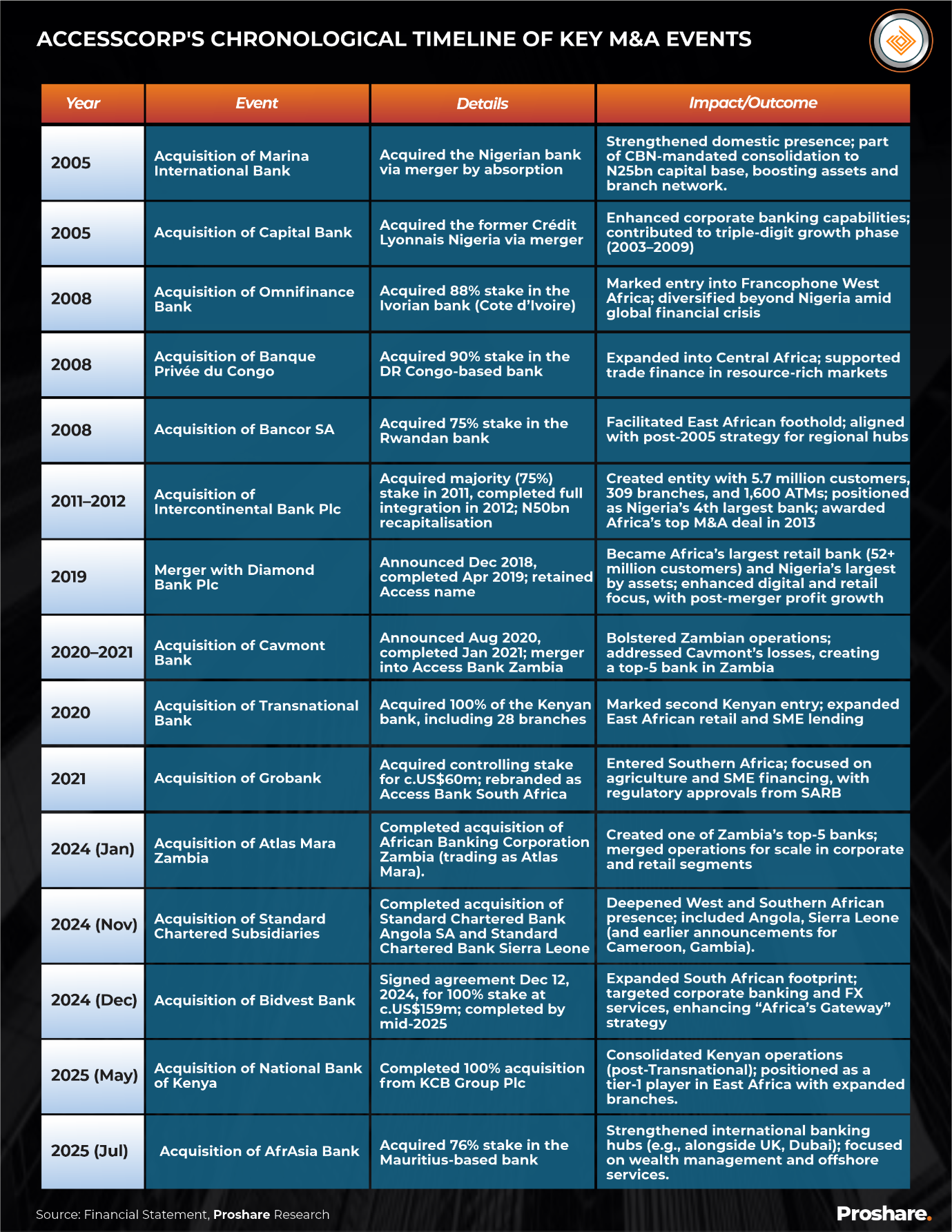
A few contextual issues are essential in reviewing Access Bank’s performance and the Nigerian banking sector in general:
- Nigeria’s banking sector is under pressure. This will continue until the end of 2026 as the federal government’s fiscal and monetary policies reshape the economy. Indeed, the economy is resetting after the significant devaluation of the domestic currency in 2023.
- The reset cycle is expected to end when the high cost of government treasury instruments falls, thereby reducing the crowding-out effect on private sector lending. The recapitalisation of banks has helped to temper the severity of the impact of high-priced treasuries on corporate borrowing costs and credit access.
- Banks that do not have cash flowing into their treasuries because of the Central Bank of Nigeria (CBN)-inspired recapitalisation exercise will suffer fiscal hardship from 2027.
- A countervailing trend is the growth of the real sector of the economy, with companies declaring improved top and bottom-line earnings growth. This will be expected to self-correct in 2026/2027. The real sector of the economy suffered a significant profit implosion in 2023 and 2024. Analysts note that in 2023 and 2024, the banking sector won while the real sector lost, resulting in a classic economy-wide zero-sum game.
- Proshare’s Economic and Market Intelligence Unit (EMIU) observes that a few companies are prepared for the forthcoming economic shifts between 2026 and 2027. At the top of the list would appear to be Dangote Refinery, which intends to increase production capacity from 650,000 barrels per day to 1.4m barrels per day. The scaling of activities would take advantage of lower domestic funding costs, shifting geopolitical realities in the international oil market (for example, Nigeria has locked in long-term oil deals with certain fast-growing Asian economies), and greater access to longer-dated credit.
Banks like Access Bank are well-positioned to benefit from the changing global economic and political context, which should at least improve corporate gross and net earnings over the eight operating quarters ahead.
Disclaimer
This report is prepared based on research, market information, and data gathered and analysed with the best global practices. It is provided for informational and educational purposes only.
It does not constitute investment advice, a recommendation to buy or sell any security, or an offer to solicit any transaction. Nothing herein shall create a client-advisor relationship between the reader and our Firm, its analysts, or any associated companies.
You should not construe any of this information as a substitute for investment financial advice. We are not registered investment advisors, and you should consult a qualified financial adviser before making any investment or trading decision.
Securities trading involves inherent risks, including the potential loss of capital. Readers of the Note assume full responsibility for all individual trading decisions and their outcomes. See our Terms of Use.

For further updates on AccessCorp, follow the company Proshare Investor Relations (IR) Portal.




